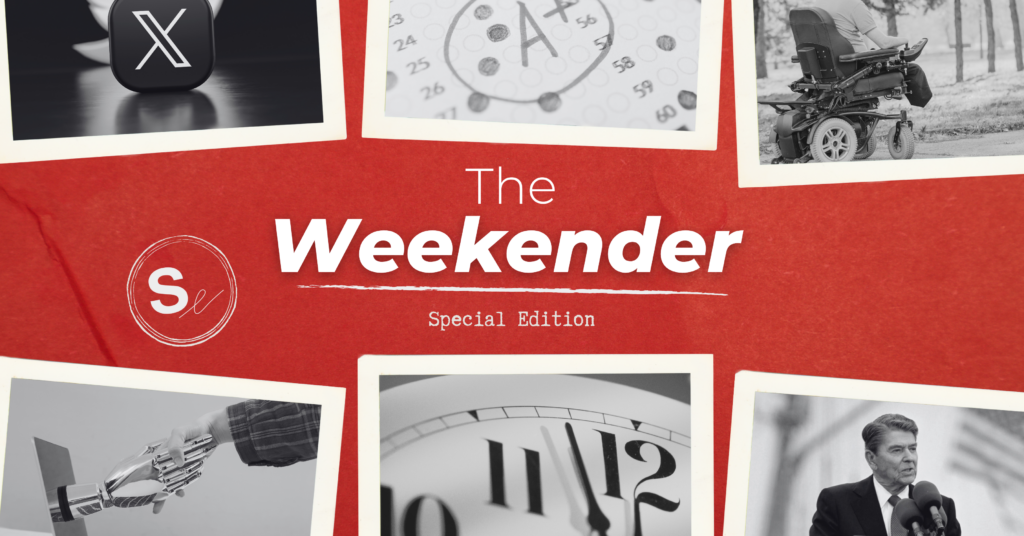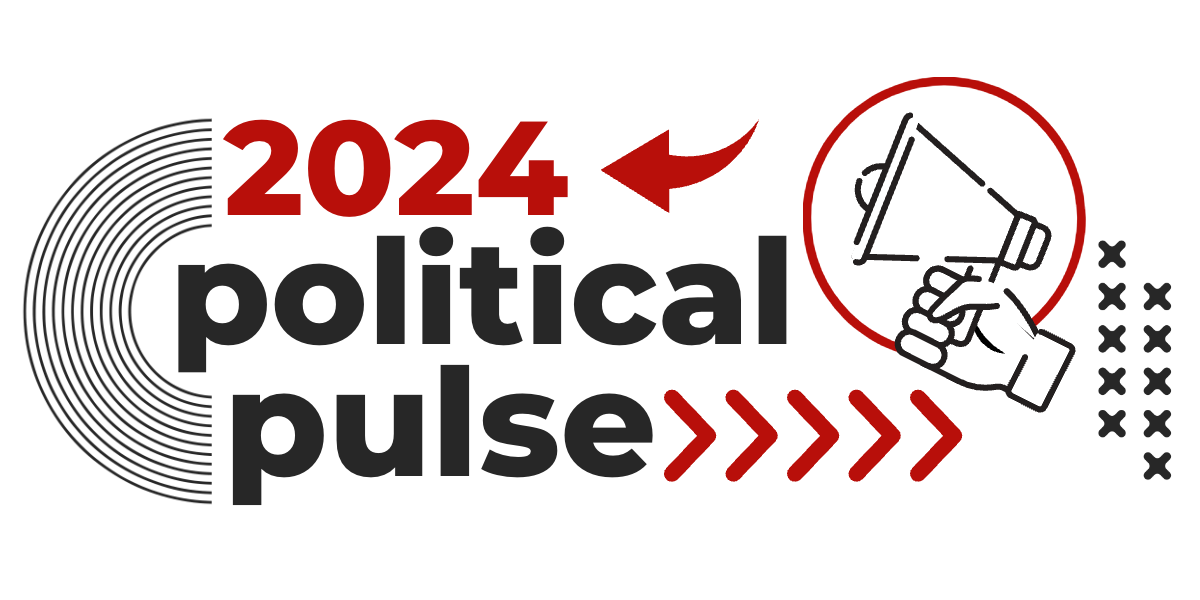
DATA POINTS
- 10: The number of days until Christmas
- 75%: The percentage of drug-related, pharmacist-reviewed ChatGPT answers that have been found to be incomplete or wrong
- 89: The number of record-setting weeks Taylor Swift has been #1 on the Billboard Artist 100 chart
- 2 Million: The number of Tesla vehicles recalled on December 13th
- $700 Million: Shohei Ohtani’s contract with the Dodgers; the largest in North American sports history
- $4.5 Trillion: The amount spent on healthcare in the U.S. in 2022
 Sept. 29: The GOP and The Gipper
Sept. 29: The GOP and The Gipper
The candidates stood in Ronald Reagan’s presidential library in the shadow of an impressive Boeing 707 used as Air Force One during his administration. The moderators began the debate with a snippet of The Gipper’s immortalized “A Time for Choosing” speech. And several candidates tried to align themselves with the man who many consider one of the greatest Republican presidents of all time.
Throughout his campaign, former Vice President Pence has sought to align himself with the 40th president while pointing out differences between the party of Reagan and the party of Trump. Senator Scott has quoted Reagan on the campaign trial. But others are straying away from the policies of Reagan, especially surrounding immigration.
While Reagan was outspokenly supportive of legal immigration, some candidates on the debate stage took different approaches. Former Governor Christie said we must “enforce the law.” Former Governor Haley, the daughter of Indian immigrants, stated, “Only when we fix the immigration system, only when we make the border secure should we ever put more money into this.” And Vivek Ramaswamy, also the son of Indian immigrants, suggested discontinuing U.S. citizenship for babies born in America to illegal immigrants.
April 21: Twitter’s X-Factor
Does Twitter have the X-factor? Owner, Elon Musk seems to think it does. While the social media platform on users’ phones and computers still has the branding, Twitter Inc. no longer exists. It is now incorporated in Delaware and merged into X Corp, a privately held company incorporated in Nevada. The company’s principal place of business remains in San Francisco, where Twitter is based. The information on the recent filings about the change prompted online speculation that it is part of Musk’s plan to use his acquisition of Twitter to help create “X, the everything app.”
Musk’s history with the letter goes back to his former online banking startup, X.com, which later became Paypal after merging with another firm. According to corporate-law specialists, moving the company from Delaware to Nevada has broader business implications. Nevada’s laws grant a company’s management and its officers more discretion and protection. Musk also has other business ventures in Nevada, including Tesla Inc., the electric-vehicle maker, and The Boring Co., Musk’s tunneling company. In the meantime, don’t worry: the popular bluebird won’t fly off the app, even if the legacy blue checkmarks do.
Oct. 27: You Can’t Spell Pichai without AI

The advertising boon is good news for Google’s AI development as it provides a boost to its capital as Facebook attempts to replicate the Microsoft-backed ChatGPT. Pichai, dedicated to staying on top of the artificial intelligence exigence, has led Google to release a slew of AI-infused tools, including an email drafting bot and incorporating AI features into its flagship search.
All the big names are allocating resources into winning the proverbial “AI Space Race” with Amazon, Meta Platforms, and Alphabet (owner of Google) investing a combined hundreds of billions of dollars into the industry. Max Tegmark, professor of physics and AI researcher at the Massachusetts Institute of Technology, is concerned. In his open letter signed by thousands of tech leaders including Elon Musk and Apple co-founder Steve Wozniak, he called for a pause in AI development. He noted the world is “witnessing a race to the bottom that must be stopped.” He agrees that AI is promising and brings innumerable benefits, but that its broad implementation without oversight or regulation poses a significant threat to our way of life.
Nov. 17: “This Report Card Says Johnny’s a Genius!”

During the pandemic, grade point averages and test scores jumped as school districts eased grading policies to account for the chaos, routine rework, and difficulties students faced. Now that students have returned to in-class education, some leniency may linger. This would artificially create stronger report cards for students and excuse parents for harboring doubts about academic growth. Parents, seeing the good grades, are not choosing to provide supplemental education, like summer school or tutoring.
Providing parents with more comprehensive and informed report cards, paired with a return to pre-COVID grading metrics, may enable parents to make a more educated decision about their children’s academic performance.
Sept. 22: Science vs. Depression

In a testament to what we already know about intra-human connectivity, a team of scientists recently sought to discover potential chemical relationships between debilitating depression (or “major depressive disorder”) and lifestyle choice that affects millions.
Over nine years, the team examined nearly 290,000 participants of all ages and identified seven key factors to reducing rates of depression: moderate alcohol consumption, a good diet, frequent exercise, proper sleep, no smoking, moderate sedentary behavior, and social mixing. For those who focused on only one of the seven, their risk for depression reduced by 17%. But those whose who prioritized all seven were 72% less likely to experience depression. Healthy sleep habits, foregoing smoking, and social mixing were the most important of the seven factors.
May 5: War of the Wardrobes: Skinny vs. Baggy Jeans

Unsurprisingly, the rise of skinny jeans among Millennials was a fashion revolution akin to the knicker knock-out the current youngest generation currently wages. Millennials, despising the ill-fitted leg-hiders worn by their parents, sought out skinny jeans as a more stylish and comfortable alternative to lifeless, downtrodden trousers of their predecessors’ day. It appears each passing generation attempts to take a short position against their parents’ pants, and it does not look like Gen Z will be giving any slack in their struggle against the slim fit. Overall, we are curious to see which chaps will chap subsequent generations.
INTERNATIONAL SPOTLIGHT
Aug. 11: What’s in a Name?
To be scotch, it must be made in Scotland; to be champagne, it must be made in Champagne, France; and to be bourbon, it must be made in the U.S. (not only Kentucky) – to name a few. International fights over the rights to name products have been a sticking point for global trade for years. New battles are still popping up daily despite the U.S. and E.U. being longtime allies and trade partners. There are currently more than 3,500 protected items, marking a 28% increase in filed protections since 2010.
The E.U. is increasing the number of their domestic products which receive special naming treatment and is easing the application for member countries to add their products to the list. This puts American producers in a difficult position. They sell products under popular names that have been in the public domain for decades or centuries – and now face countries claiming them as their own.
The E.U. mentions that its system does not prevent U.S. producers from selling products in America under protected names, but it will legally change how they export and sell products in Europe. This may result in dropped international sales by forcing producers to change their products’ names from the ones consumers recognize. It may also lead to higher costs to repackage existing goods under new names.
These negotiations present an interesting point of contention to the determining factors of what qualifies as “anti-competitive” or “public domain,” and the intricacies of the global economy.
See you next year!
Be sure to follow us on Facebook, Twitter, and LinkedIn for more news and industry updates. To receive a copy of The Weekender in your inbox, sign up here.





